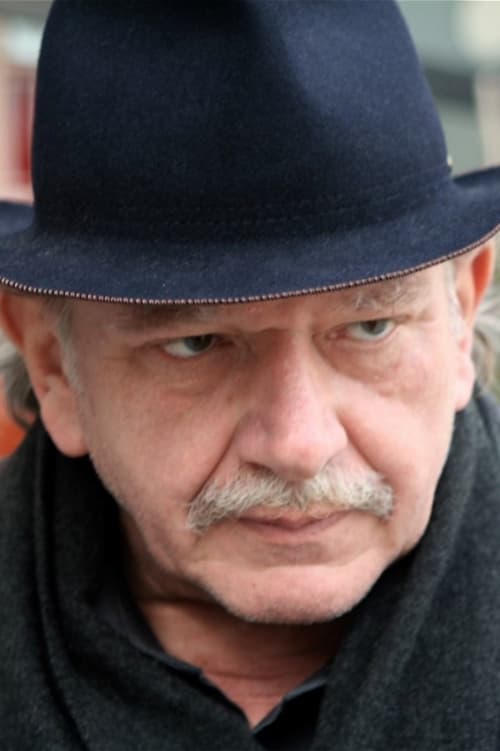Jean-Louis Comolli
出生 : 1941-07-30, Philippeville - Constantine - France - [now Skikda, Algeria]
死亡 : 2022-05-19
略歴
Jean-Louis Comolli is a French filmmaker, screenwriter and writer, born in 1941 in Philippeville (now Skikda, Algeria). After working for Les Cahiers du Cinéma from 1962 to 1978, of which he was editor in chief from 1966 to 1971, he became a director of fiction and documentaries. Also a journalist for Jazz Magazine, he has co-written or edited several books on jazz. His multiple works and his theoretical thinking on cinema have nourished many filmmakers and documentary lovers. He died on May 19, 2022.

A few months before he died, Jean-Louis Comolli meets up with Dominique Cabrera for some free conversations with Isabelle Le Corff. They talk about cinema, life, love, death and Chassagne-Montrachet wine. There is laughter and smiles. One is not really serious at the age of eighty.
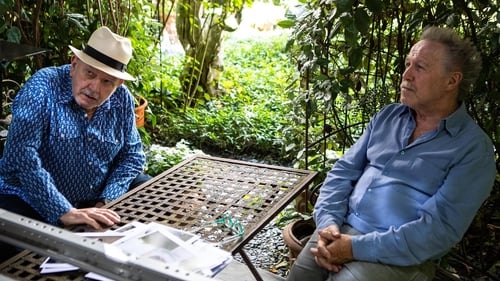
Director
This is a peaceful conversation between two filmmakers, Nicolas Philibert and Jean-Louis Comolli. A conversation, or the pleasure of spending time together. Nicolas Philibert describes with great precision his way of working and invites us to examine the ethical dimension of his process.

Director

Director
Resorting to the images that make up three quarters of the last century, Jean-Louis Comolli chose films that crossed his path fifty years ago, discovering his own history of cinema, and particularly the documentary cinema. Visual score orchestrated by a voice off (his) which lists topics that are important to him - the place of the viewer, the fiction in the documentary, the impact of technical progress on the artistic field ... -, the film weaves unpredictable wires between the excerpts .

Director
Jean-Louis Comolli and Jean Narboni, former editors at Cahiers du Cinema, interview their former colleagues and fellow travellers during the "Red Years" of the journal between 1968 and1973.

himself
Jean-Louis Comolli and Jean Narboni, former editors at Cahiers du Cinema, interview their former colleagues and fellow travellers during the "Red Years" of the journal between 1968 and1973.

Director

Director
French film and WWII historian Sylvie Lindeperg analyzes Alain Resnais's seminal 1956 film, "Night and Fog", and attempts to place it in the context of the historical treatment of WWII, and specifically of the Holocaust, in the decade following those harrowing events. Oddly, she argues that the images of Resnais's famous film are "powerless", in her words.

Director

Director
In June 1999, Jean-Claude Gaudin organized a great popular festival, "La Massalia", to celebrate all the communities that make up Marseilles and to show the desire of thousands of people from elsewhere to be Marseillais. A radiant rainbow. Less than a year later, in March 2000, the municipal campaign began: what about this new state of mind that seemed to be blowing over Marseilles' political life? Does it find a translation in the political sphere? How many children of recent immigration would be in an eligible position and would eventually be elected among the 101 municipal councilors?

Director
Two daughters of North African immigrants, born in Marseilles, who are barely over thirty years old, take part in the political battles and local elections: Nadia Brya in the cantonal elections, and Samia Ghali in the municipal ones.

Director

Writer
Filmed between February and March 1999 in La Cupula (Girona), the rehearsal place of the Spanish independent theater company Els Joglars, this documentary reveals the creative process of this company in its project to represent the life of the mythical anarchist leader Buenaventura Durruti, as well as the circumstances of his death.

Director
Filmed between February and March 1999 in La Cupula (Girona), the rehearsal place of the Spanish independent theater company Els Joglars, this documentary reveals the creative process of this company in its project to represent the life of the mythical anarchist leader Buenaventura Durruti, as well as the circumstances of his death.

Director
1997 legislative elections: a few days before the dissolution of the National Assembly, it appears that the central problem of this new battle is that of an evaluation of the balance of power between the governing right (RPR-UDF) and the extreme right (FN).

Director
Based on an idea by the writer Francis Marmande, Michel Portal, jazz clarinetist, leads young virtuoso musicians for this concerto.

Director
A political fable. A tragicomedy set in Marseille during the municipal elections of June 1995. In populist northern districts, they rally around the "Nord Ambition" of Bernard Tapie. In pushing for Tapie to take town hall, they count on his support for the northern districts, but difficulties and disappointments follow. Tapie ends up backing the very enemies of his followers, so what happens then? Big fish eat small ones. This is the fourth installment of the Marseille political saga which began with, "Marseille from father to son" (1989).

Director
Documentary covering the career of French composer Georges Delerue, famous for film scores for such films as Platoon, Contempt, Shoot the Piano Player, and Jules and Jim.

Director
A “Cinéma, de notre temps” series episode directed by french film critic Jean-Louis Comolli, originally aired 16 April 1993.

Director
The scenes take place in the Ile-de-France (Paris area) social security office (CRAMIF). From October to December of 1992, we filmed the "Invalidity" and "Occupational Accidents" departments, as well as the mail room, the typists and the archivists. This "real life" is nothing but real, so real ; eight hours a day in the office for those who are called the "laborers of the service industry".

Director
During the campaign of the legislative elections of 1995, most of the protagonists of Marseille from father to son reflect on the notion of democracy, the future of parties, the differences between left and right.

Director
From June 1991 to March 1992, nine months of a violent and agonizing political battle, in Provence, on the occasion of the regional elections.

Writer
Ofelia is the daughter of photographer Miguel and of deceased circus artist Lea. When her father is hospitalised with a nervous breakdown, she decides to find out the reason and in doing so discovers the truth about the relationship between her parents and the true fate of her mother.

Director

Director

Director

Writer

Writer

Director

Writer
The time is the 1930s and two Soviet spies (both Frenchmen by nationality) have been helping Communist factions during the Civil War in Spain. It is the time of Stalin's iron rule in the USSR, and the two agents are suddenly called to Moscow by the KGB. Knowing that they are in trouble for no fault of their own, fear drives one of them to suicide while the other gets his lover and her child and begins a run for his life, knowing that the KGB will never let him go free.

Director
The time is the 1930s and two Soviet spies (both Frenchmen by nationality) have been helping Communist factions during the Civil War in Spain. It is the time of Stalin's iron rule in the USSR, and the two agents are suddenly called to Moscow by the KGB. Knowing that they are in trouble for no fault of their own, fear drives one of them to suicide while the other gets his lover and her child and begins a run for his life, knowing that the KGB will never let him go free.

Director
A documentary about italian comic Totò.

Writer
At the end of the nineteenth century, Italian anarchists, ten men, one woman, libertarian, collectivist emigrate to Brazil to start a leaderless community, without hierarchy, without a boss without police, but not without conflict nor passion.

Director
At the end of the nineteenth century, Italian anarchists, ten men, one woman, libertarian, collectivist emigrate to Brazil to start a leaderless community, without hierarchy, without a boss without police, but not without conflict nor passion.

Director
A “Cinéastes de notre temps” series episode directed by french film critic Jean-Louis Comolli, originally aired 5 March 1971.

Director
A “Cinéastes de notre temps” series episode directed by french film critics André S. Labarthe and Jean-Louis Comolli, originally aired 11 November 1968.

Director
The campaign of the parliamentary elections of June 1968 in Asnieres with the three main candidates: Albin Chalandon ( UDR ), Claude Denis ( PCF ) and Roger Hanin ( FGDS ).

Director
A “Cinéastes de notre temps” series episode directed by french film critic Jean-Louis Comolli, originally aired sometime in 1968.

Lui-même
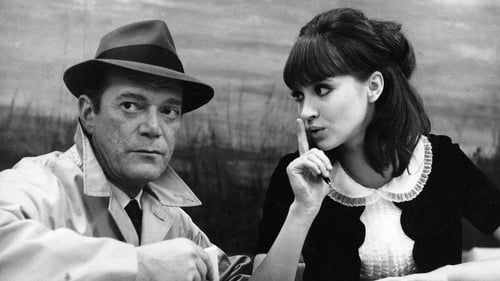
Prof. Jeckell (uncredited)
コンピューター・アルファ60に支配され、何の感情もなしに人々が暮らす星雲都市アルファヴィル。活劇シリーズ物のヒーロー左利きの探偵レミー・コーションは、ブラウン教授救出の命を受けてそこに潜入。だが教授こそコンピューターの開発者だった。
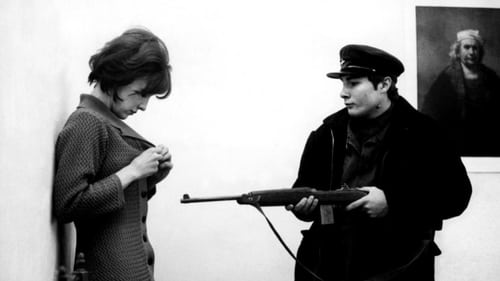
Soldier with Fish
During a war in an imaginary country, unscrupulous soldiers recruit poor farmers with promises of an easy and happy life. Two of these farmers write to their wives of their exploits.
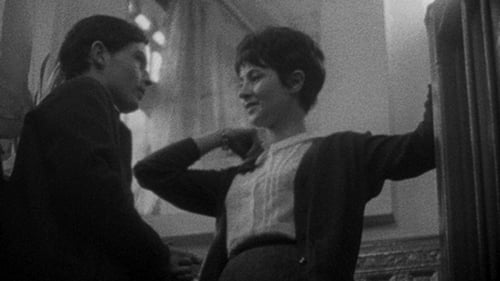
Party Guest (uncredited)
In the second of Rohmer's moral tales, he examines the relationship between two friends and a girl who at first appears easily exploited. It is a complex tale of feelings and misconceptions, acted out within the head of the main character, as part of Rohmer's attempt to more easily simulate the mindscape quality of literature within a film.
